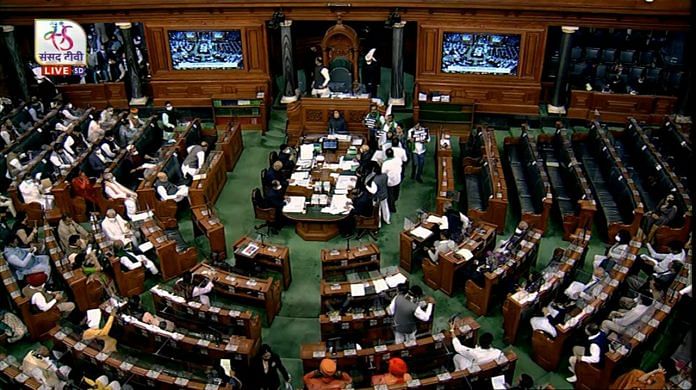New Delhi: The Lok Sabha Monday passed the Narcotic Drugs and Psychotropic Substances (NDPS) (Amendment) Bill, 2021, which aims at correcting “drafting errors” in the NDPS Act, 1985.
Finance Minister Nirmala Sitharaman, introducing the bill, said there was “no reason to oppose” it as it simply seeks to rectify “clerical errors” in the existing law.
The bill will replace an ordinance that the government promulgated in September.
However, the opposition called the amendment “unconstitutional” as the legislation is set to be applied retrospectively from 2014, and alleged that the government was trying to legislate through ordinances and bypass parliamentary procedure.
The amendment
The NDPS Act, 1985, regulates the manufacture, transport and consumption of narcotic drugs and psychotropic substances. In 2014, the Act was amended and the clause number of the definition of “illicit activities” changed. However, the section on penalties for financing such activities was not changed, so it continued to refer to the earlier clause number of the definition.
The matter came up before the Tripura High Court, when an accused pointed out that the penalty section referred to a blank list. In June this year, the court asked the government to amend the law.
On 30 September this year, the government promulgated an ordinance amending the section on penalties to correct this. The new bill will replace the ordinance, and the amendment will be deemed to have been in effect from 1 May 2014.
While introducing the Bill, Sitharaman said a court order had necessitated the ordinance.
“There is no ground on which this particular amendment bill can be objected to. The primary reason that any party in opposition can oppose the bill is because they will say that one can’t legislate through ordinances. You need to have proper legislation going through the House,” said Sitharaman.
“In this case, that is exactly what we are trying to do. We are trying to bring in legislation where an ordinance had to come… The ordinance had to come because of a court order. It was a result of a little clerical error in which some of the cross-referencing did not get corrected,” she added.
‘High time to do away with ordinances’
Biju Janata Dal MP Bhartruhari Mahtab, who initiated the debate, said it was “high time” that India did away with the concept of ordinances. He added that the number of ordinances being promulgated has been increasing over the years, irrespective of which government is in power.
“Britain does not have the provision for ordinances anymore. It is high time we also do away with the ordinance mechanism,” said Mahtab.
“There are a number of parliaments which sit through the year, but because we have sessions here, lawmaking has to be done through ordinances, which is a logic successive governments have given.”
Mahtab also criticised the bill for being “retrospective” in nature, and thereby “unconstitutional”, as Article 20 (1) of the Constitution states that citizens cannot be punished for an act that was legal at the time it was performed.
Congress MP Manish Tewari also questioned the retrospective nature of the bill and said it was a “pure question of law”.
“The question is, can a substantive sentencing provision in criminal law be given a retrospective effect by a legislative declaration?” he asked.
(Edited by Rohan Manoj)
Also read: As Modi govt plans NDPS Act changes, 27,072 drug case undertrials in India rot in jails



